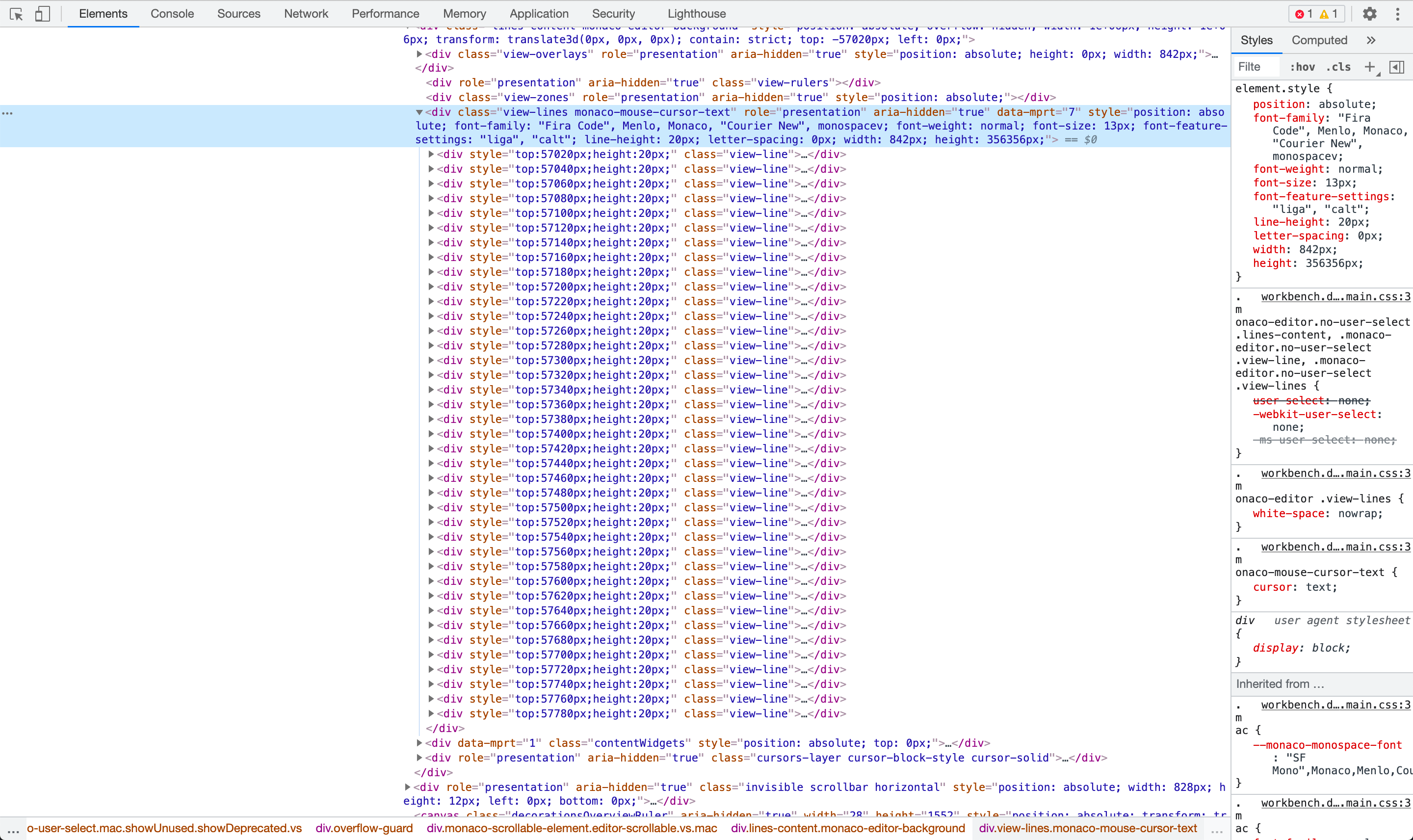本文主要探索, VSCode 是如何把 1w+ 行代码呈现出来,且做到滚动不卡顿的。
前不久,一同事与我探讨怎么解决渲染大列表的问题。第一个就想到虚拟列表,但是效果不是特别理想。随后想到 VSCode 在滚动大文件(约 1w 多行代码)的时候,很丝滑。随后便研究了一下。特此记录。
VSCode 的效果
用 VSCode 随便打开一个 1w+ 的文件,最初加载的时间,会稍微多一点点。但是之后的滚动,却能做到没有丝毫的白屏。无论是滚动还是拖动,效果都非常的丝滑,简直就像是吃过德芙一样。
猜想以及尝试
看到这个效果,的第一想法:VSCode 肯定用了虚拟列表,不然 1w+ 的 dom 节点,仅是渲染,都会让页面卡的不行。
为了验证这个想法,直接找了一个几个 star 较高的虚拟列表库,尝试用了用。例如 react-virtualized 、vue-virtual-scroll-list、ngx-virtual-scroller。
这三个都很优秀,但是在快速滚动的时候,都还是会出现一点点白屏的间隙。
效果都不是特别理想。看来 VSCode 的做法估计还有点不一样。只有啃啃 VSCode 的源代码才接揭晓答案了。
解密 VSCode 的做法
打开 VSCode 的调试工具,看看具体的渲染效果,如下图:

可以看出,的确是利用虚拟列表的技术,仅渲染了可视区域的代码。且是利用 css 的 top 值来确定每一行代码的相对坐标。
那么它是怎么做到,快速滚动不白屏的呢?
带着这个疑问,先试试自己去实现一个虚拟列表,差不多也是依葫芦画瓢,效果不是特别理想。快速滚动的时候也会出现白屏。
粗略分析一下,猜测原因是出在监听 scroll 事件上。因为 scroll 事件是在滚动时触发的。
The scroll event fires when the document view has been scrolled. --- MDN
因此,为了验证这个猜想,把 scroll 事件,换成 wheel 事件。注:这样的做法并不严谨,但是为了验证猜想足以。
换成 wheel 之后,结果稍稍好了一点点,但是快速滚动依旧是有白屏。看来还是不对。
这下就越来越对 VSCode 的做法感兴趣了,那么,是时候展现 VSCode 的技术了。
经过不断的啃代码,总算找到渲染每一行代码的源代码了。 source: viewLines.ts
public renderText(viewportData: ViewportData): void {
// (1) render lines - ensures lines are in the DOM
this._visibleLines.renderLines(viewportData);
this._lastRenderedData.setCurrentVisibleRange(viewportData.visibleRange);
this.domNode.setWidth(this._context.viewLayout.getScrollWidth());
this.domNode.setHeight(Math.min(this._context.viewLayout.getScrollHeight(), 1000000));
// (2) compute horizontal scroll position:
// - this must happen after the lines are in the DOM since it might need a line that rendered just now
// - it might change `scrollWidth` and `scrollLeft`
if (this._horizontalRevealRequest) {
const horizontalRevealRequest = this._horizontalRevealRequest;
// Check that we have the line that contains the horizontal range in the viewport
if (viewportData.startLineNumber <= horizontalRevealRequest.minLineNumber && horizontalRevealRequest.maxLineNumber <= viewportData.endLineNumber) {
this._horizontalRevealRequest = null;
// allow `visibleRangesForRange2` to work
this.onDidRender();
// compute new scroll position
const newScrollLeft = this._computeScrollLeftToReveal(horizontalRevealRequest);
if (newScrollLeft) {
if (!this._isViewportWrapping) {
// ensure `scrollWidth` is large enough
this._ensureMaxLineWidth(newScrollLeft.maxHorizontalOffset);
}
// set `scrollLeft`
this._context.model.setScrollPosition({
scrollLeft: newScrollLeft.scrollLeft
}, horizontalRevealRequest.scrollType);
}
}
}
// Update max line width (not so important, it is just so the horizontal scrollbar doesn't get too small)
if (!this._updateLineWidthsFast()) {
// Computing the width of some lines would be slow => delay it
this._asyncUpdateLineWidths.schedule();
}
if (platform.isLinux && !this._asyncCheckMonospaceFontAssumptions.isScheduled()) {
const rendStartLineNumber = this._visibleLines.getStartLineNumber();
const rendEndLineNumber = this._visibleLines.getEndLineNumber();
for (let lineNumber = rendStartLineNumber; lineNumber <= rendEndLineNumber; lineNumber++) {
const visibleLine = this._visibleLines.getVisibleLine(lineNumber);
if (visibleLine.needsMonospaceFontCheck()) {
this._asyncCheckMonospaceFontAssumptions.schedule();
break;
}
}
}
// (3) handle scrolling
this._linesContent.setLayerHinting(this._canUseLayerHinting);
this._linesContent.setContain('strict');
const adjustedScrollTop = this._context.viewLayout.getCurrentScrollTop() - viewportData.bigNumbersDelta;
this._linesContent.setTop(-adjustedScrollTop);
this._linesContent.setLeft(-this._context.viewLayout.getCurrentScrollLeft());
}从源代码可看出,其做法是确保在 dom 渲染完成之后,再更新滚动条。那么按照这个想法,就需要捕获所有可能的滚动操作,然后在更新滚动值之前,确保 dom 渲染完成。
从理论上来讲,这样的确能有效的防止白屏。
光讲理论怎么行呢,还是要试一下才行。尝试用这个方式,写了一个 demo: test-vscode-render-lines,仅实现捕获 wheel 事件,效果还不错,无论滚动多快,都没有出现白屏。
结语
至此,这次探究告一段论。目前仅尝试在固定每一行高度时,去计算出现在可视区域的 dom 元素,这样能在几乎 1 ms 之内完成。那么,问题来了。如果高度不是固定的,是可变的怎么办呢?计算时间会不会增加,如果列表元素太复杂了,渲染时间增加了,会不会出现滚动卡顿的情况?这些都还是需要测试。
目前看来,这种做法,在列表元素较少且高度固定时,表现比普通的虚拟列表好。除此之外的情况,或许还是普通的虚拟列表更优吧,这个就等之后再去探索了。